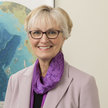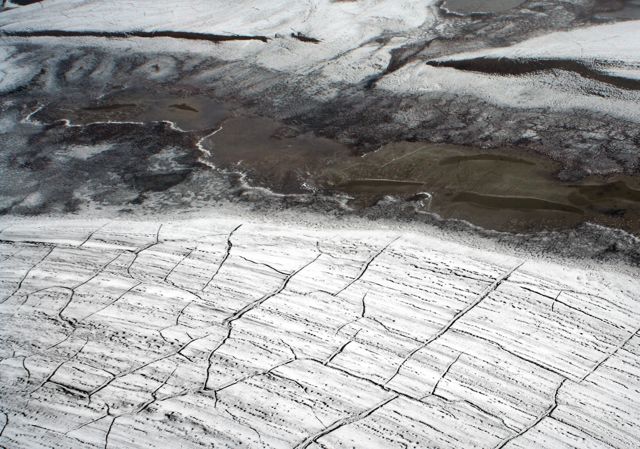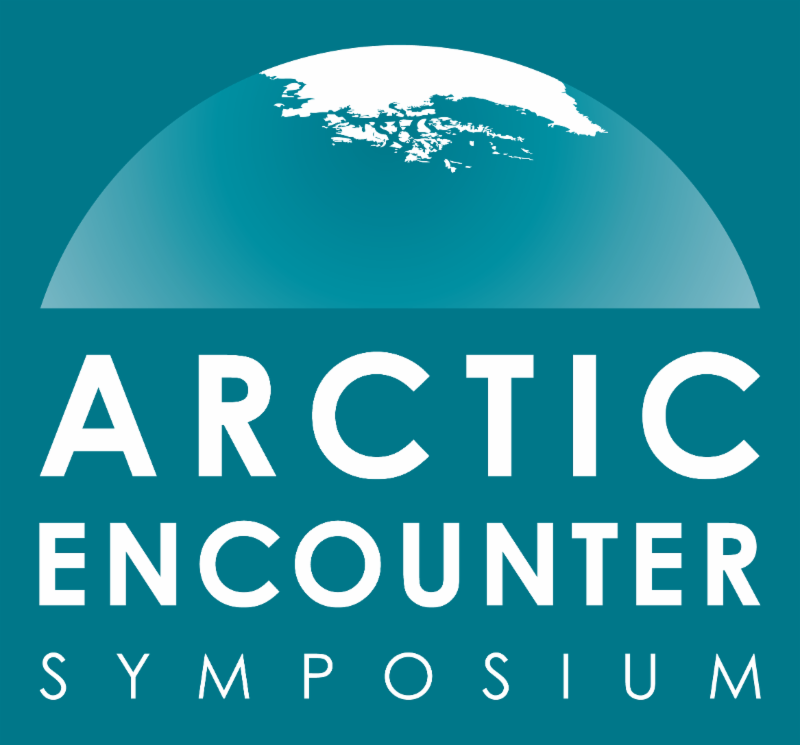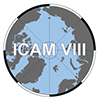|
|
|
|
|
|
|
|
No Arctic-science events are announced for today.
|
Media
 A "New Ocean" is Emerging at the Top of the World. A "New Ocean" is Emerging at the Top of the World. As the planet warms, the Arctic is warming more than twice as fast. As ice cover is disappearing, average summer sea ice has declined by more than a third since 1979. That's roughly equal to the entire area of the Western U.S. This means more than rising sea levels and troubled polar bears. It is also shifting global trade routes and altering the balance of power between countries surrounding the Arctic. KQED's Brian Watt spoke about this with Fran Ulmer, chair of the United States Arctic Research Commission and a visiting professor at Stanford University. KQED
Key Biological Mechanism is Disrupted by Ocean Acidification. A team led by scientists from Scripps Institution of Oceanography at the University of California San Diego and the J. Craig Venter Institute (JCVI) has demonstrated that the excess carbon dioxide added to the atmosphere through the combustion of fossil fuels interferes with the health of phytoplankton which form the base of marine food webs. Phys.org
 Carbon Release From Permafrost Erosion Along the Yukon Coast. Carbon Release From Permafrost Erosion Along the Yukon Coast. Earth's permafrost stores an estimated 20% more organic carbon than is currently in the atmosphere. Permafrost is found along 34% of the planet's coasts, and this frozen ground frozen ground erodes at a mean rate of 0.5 meters per year, releasing an estimated 14 billion kilograms of organic carbon. Despite its major impact, precise contributions of coastal permafrost to carbon cycling remain unclear in certain parts of the Arctic, where rapid warming is likely to increase erosion rates. To address these uncertainties, Couture et al. investigated organic carbon release to the Beaufort Sea due to permafrost erosion along the Yukon Coastal Plain in northwestern Canada. EOS
Alaska Tribe Receives $10M in Federal Funds for Trails. An Alaska tribe on Nelson Island has received more than $10 million in federal funds to construct trails. The Toksook Bay Tribe will build trails that run to the community of Nightmute, and along the coast to the fishing grounds at Umkumiut, an important subsistence location, KYUK-AM reported Tuesday. "We were overwhelmed and happy and so proud for our community," Toksook Bay Tribal Transportation Manager Harry Tulik said. The 21 miles (34 kilometers) of synthetic geo-cell mats laid across the tundra will replace the current trails carved by four-wheelers and snowmobiles. The mats will stabilize the trails while providing temporary, local jobs.
|
|
Future Events
Preparing for a Northwest Passage; The Role of New England in Navigating the New Arctic, March 25-27, 2018 (Durham, New Hampshire USA). This workshop pairs two of NSF's 10 Big Ideas: "Navigating the New Arctic" and "Growing Convergence Research at NSF." During this event, participants will assess economic, environmental, and social impacts of Arctic change on New England and establish convergence research initiatives to prepare for, adapt to, and capitalize on these effects. Shipping routes through an ice-free Northwest Passage in combination with modifications to ocean circulation and regional climate patterns linked to Arctic ice melt will affect trade, fisheries, tourism, coastal ecology, air and water quality, animal migration, and demographics not only in the Arctic but also in lower latitude coastal regions such as New England. With profound changes on the horizon, this is a critical opportunity for New England to prepare for uncertain yet inevitable economic and environmental impacts of Arctic change. Workshop website: here.
48th International Arctic Workshop 2018, April 5-6, 2018 (Boulder, Colorado USA). Hosted by the Institute of Arctic and Alpine Research (INSTAAR), University of Colorado The 2018 Arctic Workshop welcomes a community that includes all career stages - from student to distinguished world-class expert. The Arctic Workshop is open to all interested in high latitude environments, including those of the past, present, and future. Talks and posters on all aspects of Arctic science, social science, and engineering are invited, including Arctic and Antarctic climate, anthropology, atmospheric chemistry, engineering and infrastructure, environmental geochemistry, paleoenvironment, sociology, archeology, geomorphology, hydrology, glaciology, soils, ecology, oceanography, Quaternary history and more. If you are studying the Arctic, this is the conference for you.
 5th Annual Arctic Encounter Symposium (AES), April 19-20, 2018 (Seattle, WA, USA) 5th Annual Arctic Encounter Symposium (AES), April 19-20, 2018 (Seattle, WA, USA) The Arctic Encounter, the largest annual Arctic policy conference in the U.S., will convene policymakers, industry leaders, scientists, Arctic artists and musical performers, and other stakeholders to debate and discuss emerging Arctic challenges and opportunities including policy, innovation, security, and development. The mission of AES is to raise awareness, engage challenges, and develop solutions for the future of the Arctic region and the people who live there. The 5th annual AES will take place in downtown Seattle at the Bell Harbor International Conference Center on Pier 66.
2018 North by North Festival, April 23-29, 2018 (Anchorage, Alaska USA). The North by North Festival captures the spirit of Alaska and the Arctic - to address our challenges and opportunities with Northern innovation and resilience, to build on a rich history and to ensure a future full of promise. The Festival is for the North, and organized by Northerners, with goals of sustainability, livability and growth. The Festival brings innovators from across Alaska, the nation and other Arctic regions to collaborate and address local and circumpolar challenges. Through knowledge, governance, business, design, film, music, food, literature and art, we celebrate the North.
Council on Earth Cryology, May 15-16, 2018 (Moscow, Russian Federation). Scientific council on Earth cryology of Russian Academy of Sciences together with Department of Geocryology of Faculty of Geology of Lomonosov Moscow State University, Institute of the Earth Cryosphere, the Tyumen Scientific Senter, Melnikov Permafrost Institute (Yakutsk) of the Siberian Branch of the Russian Academy of Science holds on May 15 - 16, 2018 an enlarged meeting with participation of the Russian and foreign scientists, engineers and experts: "Current problems of geocryology." The meeting of Scientific council on Earth Cryology of RAS has the status of the International meeting. The publication of materials in the collection of reports is planned. Submissions (Submission Form), offers on cooperation, support of a conference and papers (Sample of Paper) to e-mail: cryoconf18@gmail.com
The Effects of Climate Change on the World's Oceans, June 4-8, 2018 (Washington, DC USA). The 4th International Symposium will bring together experts from around the world to better understand climate impacts on ocean ecosystems - and how to respond. The event is hosted by a variety of groups including International Council for the Exploration of the Sea (ICES), N. Pacific Marine Science Organization (PICES), Intergovernmental Oceanographic Commission of UNESCO (IOC), and Food and Agriculture Organization of the United Nations (FAO).
 POLAR 2018, June 15-27, 2018 (Davos, Switzerland). POLAR2018 is a joint event from the Scientific Committee on Antarctic Research (SCAR) and the International Arctic Science Committee (IASC). The SCAR meetings, the ASSW and the Open Science Conference will be hosted by the Swiss Federal Institute for Forest, Snow and Landscape Research WSL under the patronage of the Swiss Committee on Polar and High Altitude Research. The WSL Institute for Snow and Avalanche Research SLF is organizing POLAR2018. POLAR 2018, June 15-27, 2018 (Davos, Switzerland). POLAR2018 is a joint event from the Scientific Committee on Antarctic Research (SCAR) and the International Arctic Science Committee (IASC). The SCAR meetings, the ASSW and the Open Science Conference will be hosted by the Swiss Federal Institute for Forest, Snow and Landscape Research WSL under the patronage of the Swiss Committee on Polar and High Altitude Research. The WSL Institute for Snow and Avalanche Research SLF is organizing POLAR2018.
5th European Conference on Permafrost, June 23-July 1, 2018 (Chamonix-Mont Blanc, France). In the continuation of the International and Regional conferences convened by the International Permafrost Association, the 5th European Conference on Permafrost (EUCOP 2018) will be held in Chamonix-Mont Blanc, France, 23rd June - 1st July 2018. The conference aims at covering all relevant aspects of permafrost research, engineering and outreach on a global and regional level. Conference website: here.
Arctic Observing Summit 2018, June 24-26, 2018 (Davos, Switzerland). The Arctic Observing Summit (AOS) is a high-level biennial summit that provides a platform to address urgent and broadly recognized needs of Arctic observing across all components of the Arctic system. AOS 2018 will be held in Davos, Switzerland ( June 24-26) and will focus on pressing issues in the implementation and support of sustained observations that can be addressed through a business-case lens. To that end, short submissions are requested that address any and all aspects of the overarching theme and sub-themes. Additional information can be found here.
17th International Congress of Circumpolar Health (ICCH17), August 12-15, 2018 (Copenhagen, Denmark). The ICCH congresses are held every third year in different locations in the circumpolar area and represent the largest scientific meetings worldwide on circumpolar health. The ICCH congresses serve as the primary source of information exchange and scholarly communication in issues relating to circumpolar health. More than 750 participants generally register and participate in each Congress, and more than 400 scientific papers or posters are usually presented.
UArctic Congress 2018, September 3-7, 2018 (Oulu and Helsinki, Finland).
The UArctic Congress 2018 will bring together key UArctic meetings and a science conference into one single gathering, including business meetings of the Council of UArctic, Rectors' Forum, Student Forum, and Thematic Networks & UArctic Institutes Leadership Team. The Congress is an integral part of the Finland's Arctic Council chairmanship program, and open to the public. The event will highlight the themes and priorities of the Finnish chairmanship, including the goals of the United Nations' 2030 Agenda for Sustainable Development, and the Paris Agreement under the UN Framework Convention on Climate Change.
The second Arctic Biodiversity Congress is hosted by the Conservation of Arctic Flora and Fauna (CAFF), the biodiversity working group of the Arctic Council, and the Ministry of the Environment, Finland. The second Arctic Biodiversity Congress will build on the success of the first Congress, held in 2014 in Trondheim, Norway, and will bring together scientists, policymakers government officials, Indigenous representatives, Traditional Knowledge holders, industry, non-governmental organizations, and others to promote the conservation and sustainable use of Arctic biodiversity.
|
|

  
4350 N. Fairfax Drive, Suite 510
Arlington, VA 22203, USA
External links in this publication, and on the USARC's World Wide Web site ( www.arctic.gov) do not constitute endorsement by the US Arctic Research Commission of external Web sites or the information, products or services contained therein. For other than authorized activities, the USARC does not exercise any editorial control over the information you may find at these locations. These links are provided consistent with the stated purpose of this newsletter and the USARC Web site.
|
|
|
|
|
|
|
|
|
 A "New Ocean" is Emerging at the Top of the World. As the planet warms, the Arctic is warming more than twice as fast. As ice cover is disappearing, average summer sea ice has declined by more than a third since 1979. That's roughly equal to the entire area of the Western U.S. This means more than rising sea levels and troubled polar bears. It is also shifting global trade routes and altering the balance of power between countries surrounding the Arctic. KQED's Brian Watt spoke about this with Fran Ulmer, chair of the United States Arctic Research Commission and a visiting professor at Stanford University. KQED
A "New Ocean" is Emerging at the Top of the World. As the planet warms, the Arctic is warming more than twice as fast. As ice cover is disappearing, average summer sea ice has declined by more than a third since 1979. That's roughly equal to the entire area of the Western U.S. This means more than rising sea levels and troubled polar bears. It is also shifting global trade routes and altering the balance of power between countries surrounding the Arctic. KQED's Brian Watt spoke about this with Fran Ulmer, chair of the United States Arctic Research Commission and a visiting professor at Stanford University. KQED Carbon Release From Permafrost Erosion Along the Yukon Coast. Earth's permafrost stores an estimated 20% more organic carbon than is currently in the atmosphere. Permafrost is found along 34% of the planet's coasts, and this frozen ground frozen ground erodes at a mean rate of 0.5 meters per year, releasing an estimated 14 billion kilograms of organic carbon. Despite its major impact, precise contributions of coastal permafrost to carbon cycling remain unclear in certain parts of the Arctic, where rapid warming is likely to increase erosion rates. To address these uncertainties, Couture et al. investigated organic carbon release to the Beaufort Sea due to permafrost erosion along the Yukon Coastal Plain in northwestern Canada. EOS
Carbon Release From Permafrost Erosion Along the Yukon Coast. Earth's permafrost stores an estimated 20% more organic carbon than is currently in the atmosphere. Permafrost is found along 34% of the planet's coasts, and this frozen ground frozen ground erodes at a mean rate of 0.5 meters per year, releasing an estimated 14 billion kilograms of organic carbon. Despite its major impact, precise contributions of coastal permafrost to carbon cycling remain unclear in certain parts of the Arctic, where rapid warming is likely to increase erosion rates. To address these uncertainties, Couture et al. investigated organic carbon release to the Beaufort Sea due to permafrost erosion along the Yukon Coastal Plain in northwestern Canada. EOS



